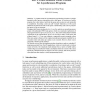Free Online Productivity Tools
i2Speak
i2Symbol
i2OCR
iTex2Img
iWeb2Print
iWeb2Shot
i2Type
iPdf2Split
iPdf2Merge
i2Bopomofo
i2Arabic
i2Style
i2Image
i2PDF
iLatex2Rtf
Sci2ools
104
click to vote
CAV
2015
Springer
2015
Springer
Bbs: A Phase-Bounded Model Checker for Asynchronous Programs
Abstract. A popular model of asynchronous programming consists of a singlethreaded worker process interacting with a task queue. In each step of such a program, the worker takes a task from the queue and executes its code atomically to completion. Executing a task can call “normal” functions as well as post additional asynchronous tasks to the queue. Additionally, tasks can be posted to the queue by the environment. Bouajjani and Emmi introduced phase-bounding analysis on asynchronous programs with unbounded FIFO task queues, which is a systematic exploration of all program behaviors up to a fixed task phase. They showed that phase-bounded exploration can be sequentialized: given a set of recursive tasks, a task queue, and a phase bound L > 0, one can construct a sequential recursive program whose behaviors capture all states of the original asynchronous program reachable by an execution where only tasks up to phase L are executed. However, there was no empirical evaluation of ...
| Added | 17 Apr 2016 |
| Updated | 17 Apr 2016 |
| Type | Journal |
| Year | 2015 |
| Where | CAV |
| Authors | Rupak Majumdar, Zilong Wang |
Comments (0)

